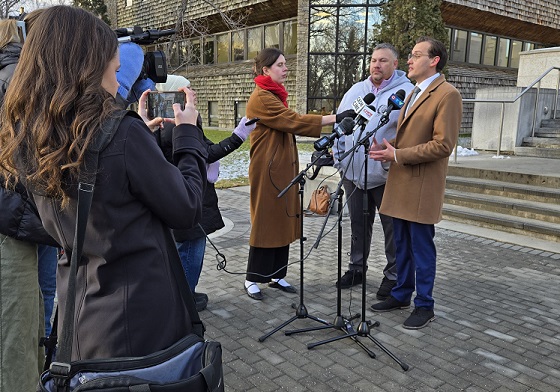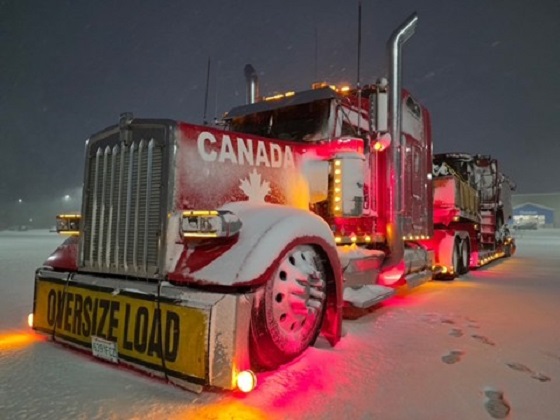Alberta
History, Controversy & Indigenous Involvement – Death of Keystone XL

For many, few stories have been as captivating and as frustrating as that of the stop-and-start Keystone XL pipeline project, which appears to officially be reaching its end following the inauguration of President Joe Biden on Wednesday, January 20, 2021.
 The Keystone XL pipeline extension was originally proposed by TC Energy in 2008 as the 4th phase of the existing Keystone Pipeline System, which traverses Canada and the United States. The 1,947 km pipeline would run from Hardisty, Alberta, to Steele City, Nebraska, dramatically increasing the transportation capacity of Alberta crude oil to 830,000 barrels per day.
The Keystone XL pipeline extension was originally proposed by TC Energy in 2008 as the 4th phase of the existing Keystone Pipeline System, which traverses Canada and the United States. The 1,947 km pipeline would run from Hardisty, Alberta, to Steele City, Nebraska, dramatically increasing the transportation capacity of Alberta crude oil to 830,000 barrels per day.
The National Energy Board first approved the Keystone XL application in March 2010, with a number of conditions in place to protect environmental and landowner interests.
 Opposition towards the project developed quickly, largely on the basis of environmental concerns. Environmental assessments released by the U.S. State Department, which established the pipeline would have “limited environmental impact”, were met with public backlash and mass protests.
Opposition towards the project developed quickly, largely on the basis of environmental concerns. Environmental assessments released by the U.S. State Department, which established the pipeline would have “limited environmental impact”, were met with public backlash and mass protests.
In 2011, the State Department required TC Energy (then TransCanada) to reroute the pipeline around an “ecologically sensitive” area in Nebraska, to which TC Energy agreed.
 In January 2012, President Barack Obama rejected the Keystone XL, but invited TC to submit another application, which was done in May 2012.
In January 2012, President Barack Obama rejected the Keystone XL, but invited TC to submit another application, which was done in May 2012.
Following another 3 years of legislative debate, protest and controversial back and forth, Obama vetoed the bill to build the Keystone XL on February 24, 2015.
On November 6, 2015, the Obama Administration once again rejected TC Energy’s application to build the Keystone XL pipeline.
In this context, tensions continued to rise, as massive amounts of money and potential jobs hung in the balance with no end in sight. In 2016, Republican presidential candidate Donald Trump included the Keystone XL in his campaign, vowing to approve it if elected as President of the United States.
 Following his election in November 2016, President Trump signed an executive order approving the Keystone XL pipeline, along with an order requiring American pipelines be built with American steel.
Following his election in November 2016, President Trump signed an executive order approving the Keystone XL pipeline, along with an order requiring American pipelines be built with American steel.
In late 2018, the pipeline’s construction was delayed once again by a U.S. federal judge, citing environmental impact.
Construction resumed in April 2020, following a pledge from Alberta Premier Jason Kenney to invest CAD$1.5 billion in the project in March 2020. Outrage from environmental and Indigenous groups continued in the wake of the announcement.
In May 2020, then-presumed presidential nominee Joe Biden shared plans to shutdown the Keystone XL as a part of his campaign. (1)
 It is January 2021, and Biden has indeed followed through on his claim to scrap the pipeline. To the outrage of many Albertans and their fellow Canadians, one of Biden’s first executive orders as President of the United States, just hours after his inauguration, was to revoke TC Energy’s permit for the Keystone XL.
It is January 2021, and Biden has indeed followed through on his claim to scrap the pipeline. To the outrage of many Albertans and their fellow Canadians, one of Biden’s first executive orders as President of the United States, just hours after his inauguration, was to revoke TC Energy’s permit for the Keystone XL.
As of December 2020, more than 150 kilometres of pipeline had already been installed. According to Financial Post, the cancellation leaves behind approximately 48,000 tons of steel.
Biden’s decision has served to deepen the division between pro and anti-pipeline groups, including the opposing positions expressed by a number of Canadian Indigenous groups.
Over the course of the past decade, Indigenous opposition to the pipeline has been well documented through a series of protests and petitions, featuring countless Canadians who rallied in support of First Nations groups, environmental concerns and land rights.
In 2016, Donald Trump’s renewed approval of the pipeline was met with equally renewed opposition by those groups determined to halt the project once and for all. “The fight to kill the Keystone XL pipeline begins anew,” said Dallas Goldtooth, lead organizer for the Indigenous Environmental Network in 2017, “and Donald Trump should expect far greater resistance than ever before.”
On the other side of this opposition, the historic formation of the Natural Law Energy coalition came as a shock to many. Natural Law Energy (NLE) is a coalition of First Nations groups who expressed their support for the Keystone XL pipeline by pursuing investment opportunities with TC Energy. Little Pine First Nation, Louis Bull Tribe, Nekaneet Cree First Nation, Ermineskin Cree Nation and Akamihk Montana Cree First Nation came together to form the coalition with the ambition of providing First Nations groups with financial resources and opportunities.
 For Chief Alvin Francis of Nekaneet First Nation in Saskatchewan, the pipeline presented an opportunity to secure funding for indigenous communities and aid indigenous youth in their schooling or business endeavors for years to come. “It’s about making life better for all of our youth,” he told the Globe and Mail in November 2020.
For Chief Alvin Francis of Nekaneet First Nation in Saskatchewan, the pipeline presented an opportunity to secure funding for indigenous communities and aid indigenous youth in their schooling or business endeavors for years to come. “It’s about making life better for all of our youth,” he told the Globe and Mail in November 2020.
Just as Indigenous anti-pipeline groups celebrate the latest development, Biden’s executive order to cancel the pipeline once again has been met with disappointment from members of the NLE and its supporters.
 Recent developments over the multi-billion dollar Keystone XL have also led to heated discussions between the Kenney Administration and Canadian Prime Minister Justin Trudeau. Kenney’s response to the Canadian Federal Government as well as the Biden Administration was one of absolute disappointment and anger, as Alberta’s oil and gas industry sustained another massive hit. He went as far as to call upon Trudeau to impose economic sanctions on the United States.
Recent developments over the multi-billion dollar Keystone XL have also led to heated discussions between the Kenney Administration and Canadian Prime Minister Justin Trudeau. Kenney’s response to the Canadian Federal Government as well as the Biden Administration was one of absolute disappointment and anger, as Alberta’s oil and gas industry sustained another massive hit. He went as far as to call upon Trudeau to impose economic sanctions on the United States.
While many have echoed Kenney’s sentiments regarding the cancellation of the pipeline and the Biden Administrations early treatment of Canada and the province of Alberta, others have identified this development as an opportunity for Alberta to diversify. Under the current economic circumstances, can Alberta overcome the loss of the Keystone XL? Should Alberta focus on diversifying? Given the ongoing global shift towards renewable energy technology, can we afford not to?
For more stories, visit Todayville Calgary.
Alberta
New pipeline from Alberta would benefit all Canadians—despite claims from B.C. premier

From the Fraser Institute
The pending Memorandum of Understanding between the Carney government and the Alberta governments will reportedly support a new oil pipeline from Alberta’s oilsands to British Columbia’s tidewater. But B.C. Premier David Eby continues his increasingly strident—and factually challenged—opposition to the whole idea.
Eby’s arguments against a new pipeline are simply illogical and technically incorrect.
First, he argues that any pipeline would pose unmitigated risks to B.C.’s coastal environment, but this is wrong for several reasons. The history of oil transport off of Canada’s coasts is one of incredible safety, whether of Canadian or foreign origin, long predating federal Bill C-48’s tanker ban. New pipelines and additional transport of oil from (and along) B.C. coastal waters is likely very low environmental risk. In the meantime, a regular stream of oil tankers and large fuel-capacity ships have been cruising up and down the B.C. coast between Alaska and U.S. west coast ports for decades with great safety records.
Next, Eby argues that B.C.’s First Nations people oppose any such pipeline and will torpedo energy projects in B.C. But in reality, based on the history of the recently completed Trans Mountain Expansion (TMX) pipeline, First Nations opposition is quite contingent. The TMX project had signed 43 mutual benefit/participation agreements with Indigenous groups along its route by 2018, 33 of which were in B.C. As of March 2023, the project had signed agreements with 81 out of 129 Indigenous community groups along the route worth $657 million, and the project had resulted in more than $4.8 billion in contracts with Indigenous businesses.
Back in 2019, another proposed energy project garnered serious interest among First Nations groups. The First Nations-proposed Eagle Spirit Energy Corridor, aimed to connect Alberta’s oilpatch to a port in Kitimat, B.C. (and ultimately overseas markets) had the buy-in of 35 First Nations groups along the proposed corridor, with equity-sharing agreements floated with 400 others. Energy Spirit, unfortunately, died in regulatory strangulation in the Trudeau government’s revised environmental assessment process, and with the passage of the B.C. tanker ban.
Premier Eby is perfectly free to opine and oppose the very thought of oil pipelines crossing B.C. But the Supreme Court of Canada has already ruled in a case about the TMX pipeline that B.C. does not have the authority to block infrastructure of national importance such as pipelines.
And it’s unreasonable and corrosive to public policy in Canada for leading government figures to adopt positions on important elements of public policy that are simply false, in blatant contradiction to recorded history and fact. Fact—if the energy industry is allowed to move oil reserves to markets other than the United States, this would be in the economic interest of all Canadians including those in B.C.
It must be repeated. Premier Eby’s objections to another Alberta pipeline are rooted in fallacy, not fact, and should be discounted by the federal government as it plans an agreement that would enable a project of national importance.
Alberta
Premier Danielle Smith says attacks on Alberta’s pro-family laws ‘show we’ve succeeded in a lot of ways’

From LifeSiteNews
Recent legislation to dial back ‘woke progressivism’ is intended to protect the rights of parents and children despite opposition from the left.
Alberta Premier Danielle Smith took a shot at “woke progressivism” and detractors of her recent pro-family laws, noting that because wokeness went “too far,” the “dial” has turned in favor of parental rights and “no one” wants their “kid to transition behind their back.”
“We know that things went a little bit too far with woke progressivism on so many fronts and we’re trying to get back to the center, trying to get them back to the middle,” Smith said in a recent video message posted on the ruling United Conservative Party’s (UCP) official X account.
Smith, who has been battling the leftist opposition New Democratic Party (NDP) attacks on her recent pro-family legislation, noted how “we’ve succeeded in a lot of ways.”
“I think we have moved the dial on protecting children and the right of girls and women to participate in sports without having to face born male athletes,” mentioning that the Olympics just announced gender-confused athletes are not allowed to compete in male or female categories.
“I think we’re moving the dial on parental rights to make sure that they know what’s going on with their kids. No one wants their kid to be transitioned behind their back and not know. I mean, it doesn’t matter what your background is, you want to know what’s going on with your child.”
Smith also highlighted how conservatives have “changed the entire energy conversation in the country, we now have we now have more than 70 percent of Canadians saying they believe we should build pipelines, and that we should be an energy superpower.’
As reported by LifeSiteNews, Smith recently said her government will use a rare constitutional tool, the notwithstanding clause, to ensure three bills passed this year – a ban on transgender surgery for minors, stopping men from competing in women’s sports, and protecting kids from extreme aspects of the LGBT agenda – remain law after legal attacks from extremist activists.
Bill 26 was passed in December 2024, amending the Health Act to “prohibit regulated health professionals from performing sex reassignment surgeries on minors.”
Last year, Smith’s government also passed Bill 27, a law banning schools from hiding a child’s pronoun changes at school that will help protect kids from the extreme aspects of the LGBT agenda.
Bill 27 will also empower the education minister to, in effect, stop the spread of extreme forms of pro-LGBT ideology or anything else allowed to be taught in schools via third parties.
Bill 29, which became law last December, bans gender-confused men from competing in women’s sports, the first legislation of its kind in Canada. The law applies to all school boards, universities, and provincial sports organizations.
Alberta’s notwithstanding clause is like all other provinces’ clauses and was a condition Alberta agreed to before it signed onto the nation’s 1982 constitution.
-

 Alberta2 days ago
Alberta2 days agoPremier Smith explains how private clinics will be introduced in Alberta
-

 Alberta2 days ago
Alberta2 days agoAlberta introducing dual practice health care model to increase options and shorten wait times while promising protection for publicly funded services
-

 Business2 days ago
Business2 days agoUS Supreme Court may end ‘emergency’ tariffs, but that won’t stop the President
-

 Aristotle Foundation2 days ago
Aristotle Foundation2 days agoWe’re all “settlers”
-

 Indigenous2 days ago
Indigenous2 days agoIndigenous activist wins landmark court ruling for financial transparency
-

 International2 days ago
International2 days ago“The Largest Funder of Al-Shabaab Is the Minnesota Taxpayer”
-

 Alberta2 days ago
Alberta2 days agoRed Deer’s Jason Stephan calls for citizen-led referendum on late-term abortion ban in Alberta
-

 COVID-1912 hours ago
COVID-1912 hours agoCrown seeks to punish peaceful protestor Chris Barber by confiscating his family work truck “Big Red”
